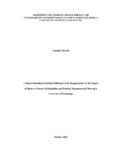Assessment of Climate Change Impact and Vulnerability of Immovable Cultural Heritage Sites: A Case Study of Kenya’s Coastline
Abstract
Researchers have developed interest on climate change as a contemporary affecting the tourism sector. Although climate change is widely acknowledged as a global phenomenon, the actual and projected effects are still being debated in the scientific and political forums. Locally, there is evidence of uncertain trends regarding the manifestation of global climate change and the required adjustments. Climate change is negatively affecting the tourism sector which is the backbone of economic development. Cultural heritage is important in that it provides tourism opportunities, enhances economic growth, stimulates learning and fosters cultural identity. Yet, change in climate elements of temperature, rainfall and rising sea level impacts the preservation of values embodied in the immovable cultural resources. Cultural heritage has survived the past centuries but the previous adaptation may not sustain them in the extreme climate conditions in the future. Some of the cultural heritage sites like Vasco da Gama, Fort Jesus and Jumba la Mtwana have been highlighted to have physical damage. The study was guided by the following objectives; general objective: assessing the effects of climate change and vulnerability of immovable cultural heritages and the responses strategies employed by the destination stakeholders. Specific objectives which include to: analyze the impacts of climate change on the immovable cultural heritage sites; assess the vulnerability of immovable cultural heritage sites to climate change; identify the adaptation strategies of the immovable cultural heritage sites; determine response to barriers in adapting immovable cultural heritage to climate change; identify how the stakeholder’s, maximize opportunities that arise in adapting immovable cultural heritage to climate change. The study was guided by the theory of adaptation. The study covered eight immovable cultural heritage sites identified in Kilifi and Mombasa counties. Questionnaires, interviews and observation methods was used in data collection. The study used descriptive analysis in analyzing descriptive data and narrative analysis for qualitative data. The results of the findings indicated that apart from climate change impacts being a major threat to the immovable cultural heritages along Kenyan coastline, old age and human activities are also other factors facilitating the deterioration of the cultural heritages. Results of the study will provide information on existing knowledge gaps concerning the effects of climate change on the immovable cultural heritage thus increase baseline data and provide solutions to heritage sites facing the effects of climate change. The study further recommended the need for more and continuous research on the causes of cultural heritage sites deterioration and measurement of how the climate change elements affects the immovable cultural heritage sites.

